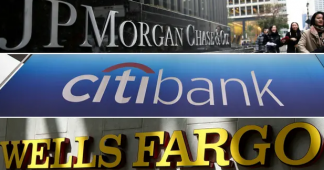Since the 1980s, fossil fuel firms have run ads touting climate denial messages – many of which they’d now like us to forget. Here’s our visual guide
by Geoffrey Supran and Naomi Oreskes
18 Nov 2021
Why is meaningful action to avert the climate crisis proving so difficult? It is, at least in part, because of ads.
The fossil fuel industry has perpetrated a multi-decade, multibillion dollar disinformation, propaganda and lobbying campaign to delay climate action by confusing the public and policymakers about the climate crisis and its solutions. This has involved a remarkable array of advertisements – with headlines ranging from “Lies they tell our children” to “Oil pumps life” – seeking to convince the public that the climate crisis is not real, not human-made, not serious and not solvable. The campaign continues to this day.
As recently as last month, six big oil CEOs were summoned to US Congress to answer for the industry’s history of discrediting climate science – yet they lied under oath about it. In other words, the fossil fuel industry is now misleading the public about its history of misleading the public.
We are experts in the history of climate disinformation, and we want to set the record straight. So here, in black and white (and color), is a selection of big oil’s thousands of deceptive climate ads from 1984 to 2021. This isn’t an exhaustive analysis, of which we have published several, but a brief, illustrated history – like the “sizzle reels” that creatives use to highlight their best work – of the 30-plus year evolution of fossil fuel industry propaganda. This is big oil’s PR sizzle reel.
Early days: learning to spin
Humble Oil (now ExxonMobil) was not self-conscious about the potential environmental impacts of its products in this 1962 advertisement touting “Each day Humble supplies enough energy to melt 7 million tons of glacier!”
The truth behind the ad: Three years earlier, in 1959, America’s oil bosses had been warned that burning fossil fuels could lead to global heating “sufficient to melt the icecap and submerge New York”.
Their knowledge only grew. A 1979 internal Exxon study warned of “dramatic environmental effects” before 2050. “By the late 1970s”, a former Exxon scientist recently recalled, “global warming was no longer speculative”.’
‘Reposition global warming as theory (not fact)’
In 1991, Informed Citizens for the Environment, a front group of coal and utility companies announced that “Doomsday is cancelled” and asked, “Who told you the earth was warming … Chicken Little?” They complained about “weak” evidence, “non-existent” proof, inaccurate climate models and asserted that the physics was “open to debate”.
The truth behind the ads: Instead of warning the public about global heating or taking action, fossil fuel companies stayed silent as long as they could. In the late 1980s, however, the world woke up to the climate crisis, marking what Exxon called a “critical event”. The fossil fuel industry’s PR apparatus swung into action, implementing a strategy straight out of big tobacco’s playbook: to weaponize science against itself.
A 1991 memo by Informed Citizens for the Environment made that strategy explicit: “Reposition global warming as theory (not fact).”
‘Emphasize the uncertainty’
Mobil and ExxonMobil ran one of the most comprehensive climate denial campaigns of all time, with a foray in the 1980s, a blitz in the 1990s and continued messaging through the late 2000s. Their climate “advertorials” – advertisements disguised as editorials – appeared in the op-ed page of the New York Times and other newspapers and were part of what scholars have called “the longest, regular (weekly) use of media to influence public and elite opinion in contemporary America”.
Between 1996 and 1998, for instance, Mobil ran 12 advertorials timed with the 1997 UN Kyoto negotiations that questioned whether the climate crisis is real and human-made and 10 that downplayed its seriousness. “Reset the alarm,” one ad suggested. “Let’s not rush to a decision at Kyoto … We still don’t know what role man-made greenhouse gases might play in warming the planet.”
The truth behind the ads: “Exxon’s position”, instructed internal strategy memos from 1988-89, was to “extend the science” and “emphasize the uncertainty in scientific conclusions” about the climate crisis. Or as a 1998 “Action Plan” by Exxon, Chevron, API, utilities companies and others declared: “Victory will be achieved when average citizens” and the “media ‘understands’ (recognizes) uncertainties in climate science”.
ExxonMobil continued to fund climate denial through at least 2018. One of their 2004 advertorials claimed “scientific uncertainties” precluded “determinations regarding the human role in recent climate change”. That was untrue. Nine years earlier, the UN’s Intergovernmental Panel on Climate Change had concluded a “discernible human influence on global climate”. ExxonMobil’s chief climate scientist was a contributing author to the report.
Continue reading at www.theguardian.com
We remind our readers that publication of articles on our site does not mean that we agree with what is written. Our policy is to publish anything which we consider of interest, so as to assist our readers in forming their opinions. Sometimes we even publish articles with which we totally disagree, since we believe it is important for our readers to be informed on as wide a spectrum of views as possible.











